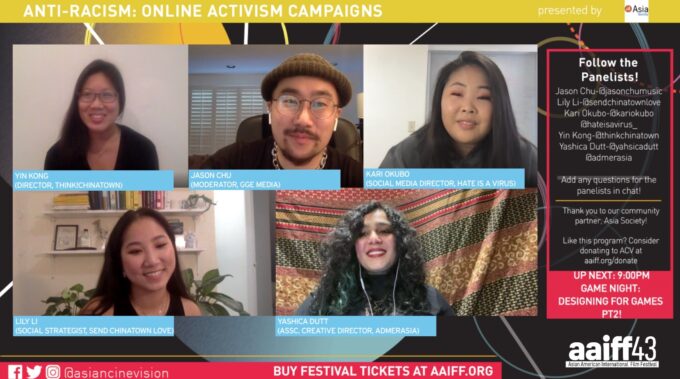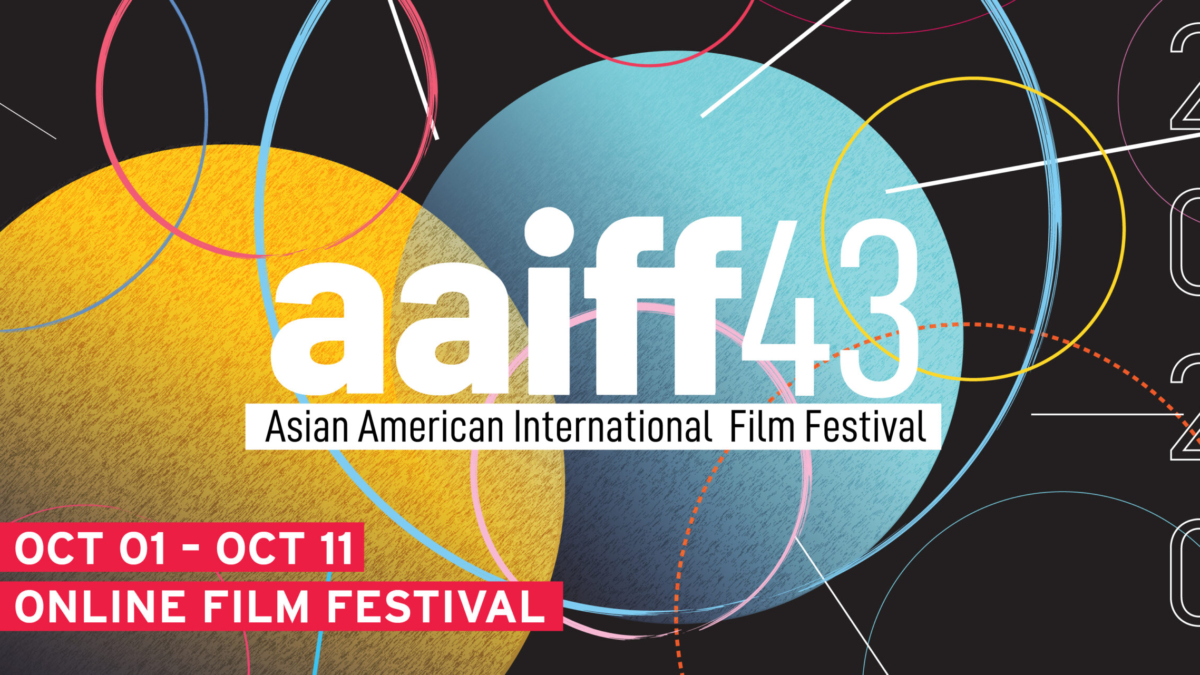Written By: Michelle Ahn
This year, despite an ongoing pandemic, we saw communities come together in support of Black Lives Matter across the nation and the world. George Floyd’s wrongful death, along with Breonna Taylor, Eric Garner and many more, created a wave of activism. At the same time, since the onstart of the pandemic, we have seen a rise in hate crimes against our own Asian American community, in due part to leadership that encourages xenophobic rhetoric with COVID-19. The world is having a reckoning moment and at last, many ears are willing to listen. On Wednesday night, AAIFF hosted part two of their two-part panel series on anti-racism to discuss online activism campaigns and how to make sure this surge in activism isn’t temporary.
Moderated by Jason Chu, a rapper, poet and activist we have previously profiled, the conversation emphasized intersectionality, staying true to yourself and your organization, and listening to others. The panelists were representatives from various organizations, both old players and new: Yashica Dutt (Admerasia), Yin Kong (Think!Chinatown), Kari Okubo (#HateIsAVirus) and Lily Li (Send Chinatown Love).
“Online activism is not virtue signaling,” said Chu. During the height of Black Lives Matter protests, everyone seemed to throw in their support, including many corporate brands. Racism isn’t something new, and yet there was a rush for individuals and companies to appear “woke,” inevitably at times appearing performative. Being a part of an ad agency, Dutt saw this firsthand and realized there was a bigger role for her to play. It wasn’t enough for a marketing agency to connect brands to local communities; it was time to “put an ear to the ground” and listen to what’s going on. Speaking about how Admerasia approaches brands now, Dutt said, “We have to constantly keep the pressure on. We have to constantly be involved in the roles of telling them what’s going on within the communities … not just create a brand presence but be more deeply involved. And that’s not going to happen overnight.” The panelists all agreed that change takes time and the key to making sure your activism isn’t performative is by creating a call to action — educate, advocate and organize.

Another big reckoning this year was the idea of racism within our own communities and how to address that. “Intersectionality” was a word thrown out a lot by all panelists, or what Okubo dubbed the “sexy word of 2020 activism.” It’s incredibly important to create anti-racism dialogue within our own communities and even address our own individual biases. But with generational and cultural differences, this isn’t always an easy feat. “For our merchants, a lot like our parents, they’ve been so focused on making a living and surviving. And we need to remember and recall that kind of patience when they don’t understand social justice issues right away in America,” Li said. Send Chinatown Love also created a crowdsourced translation guide of social justice vocabulary, such as ‘police brutality’ and ‘model minority’ to help others also have these important conversations.
Intersectionality also means working with other communities and understanding we are not mutually exclusive. Especially online, where you’re using a platform for the entire world to see, Okubo notes it’s important to have a voice for your community but also be as inclusive as possible. “The 400 years of systemic racism toward the Black community is intertwined with the 150 years of systematic racism towards Asian Americans. And so I always say our struggles while they are not the same, they are linked. And our liberation will be linked as well,” Okubo said. Speaking about the myth that it’s us versus them, Dutt said a similar sentiment: “There is no competition. There is enough for us to go around … It is when we are together, then we can really move forward.” This also means diversity should exist within your own organizations as much as possible.
Online activism campaigns do tend to focus on younger generations who are more adept to the digital landscape. However, Chu reminds us that it’s everyone’s responsibility to keep each other accountable. While we live in an online world now, it is crucial to remember where you come from and the communities on the ground. Being part of an organization that does more offline activism, Kong said, “And so if you come in, you know, using awesome tools of social media but you’re not really coming from that space, you’re not really coming from that community, and with all the greatest intentions, I would just say it’s a lot of listening.” Not everyone has access to the Internet constantly, especially those in older age groups. For this reason, Think!Chinatown will be projecting an art collaboration with the Black Gotham Experience on the streets at their upcoming Chinatown Arts Week in addition to a virtual program for the project.
Kong also mentioned how newer, online campaigns shouldn’t forget that there may have been local organizations and activists already on the ground doing work that’s not as visible. A fancy hashtag is great, but it’s pertinent for activists and organizations to remember to see the impact locally, rather than using likes, retweets and followers to gage success. “We need our own metrics rather than taking from corporate metrics,” Chu concluded.

